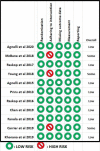Factor Xa inhibitor for venous thromboembolism management in patient with cancer: a systematic review and meta-analysis
- PMID: 35136585
- PMCID: PMC8802150
- DOI: 10.12688/f1000research.73883.1
Factor Xa inhibitor for venous thromboembolism management in patient with cancer: a systematic review and meta-analysis
Abstract
Background: An earlier systematic review reported no differences in the incidence of recurrent venous thromboembolism and major bleeding between factor Xa inhibitors and standard anticoagulation. The present meta-analysis aimed to assess the effectiveness of factor Xa inhibitors for the management of venous thromboembolism (VTE), specifically in patients with cancer, as there were more randomized clinical trials (RCTs) available. Methods: The PubMed and Cochrane Library databases were systematically screened for all RCTs assessing factor Xa inhibitor efficacy for VTE management in cancer patients. Using RevMan 5.3, we performed a Mantel-Haenszel fixed-effects meta-analysis of the following outcomes: recurrent VTE, VTE events, and major bleeding rates. Results: We identified 11 studies involving 7,965 patients. Factor Xa inhibitors were superior in preventing VTE recurrence, compared to low-molecular-weight heparin (LMWH) (OR 0.60; 95% CI 0.45-0.80; P < 0.01) and vitamin K antagonists (VKA) (OR 0.51; 95% CI 0.33-0.78; P < 0.01). As prophylaxis, factor Xa inhibitors had a similar rate of VTE compared to VKAs (OR 1.08 [95% CI 0.31-3.77]; P = 0.90) and a lower rate compared to placebo (OR 0.54 [95% CI 0.35-0.81]; P < 0.01). Major bleeding rates were higher with factor Xa inhibitors than with LMWHs (OR 1.34 [95% CI 0.83-2.18]; P = 0.23), but significantly lower than VKAs (OR 0.71 [95% CI 0.55-0.92]; P < 0.01). Conclusions: Factor Xa inhibitors are effective for VTE management in patients with cancer; however, they are also associated with an increased bleeding risk compared to LMWH, but decreased when compared to VKA.
Keywords: bleeding; cancer; factor Xa inhibitor; oral anticoagulant; venous thromboembolism..
Copyright: © 2021 Nugroho Eko Putranto J et al.
Conflict of interest statement
No competing interests were disclosed.
Figures






Similar articles
-
Factor Xa Inhibition for the Treatment of Venous Thromboembolism Associated With Cancer: A Meta-Analysis of the Randomised Controlled Trials.Heart Lung Circ. 2022 May;31(5):716-725. doi: 10.1016/j.hlc.2021.10.024. Epub 2021 Dec 9. Heart Lung Circ. 2022. PMID: 34896013
-
Comparative effectiveness of venous thromboembolism prophylaxis options for the patient undergoing total hip and knee replacement: a network meta-analysis.J Thromb Haemost. 2017 Feb;15(2):284-294. doi: 10.1111/jth.13566. Epub 2017 Jan 19. J Thromb Haemost. 2017. PMID: 28102615 Free PMC article.
-
Comparison between direct factor Xa inhibitors and low-molecular-weight heparin for efficacy and safety in the treatment of cancer-associated venous thromboembolism: A meta-analysis.J Cancer Res Ther. 2019;15(7):1541-1546. doi: 10.4103/jcrt.JCRT_68_19. J Cancer Res Ther. 2019. PMID: 31939435
-
Editor's Choice - A Systematic Review and Meta-Analysis of the Efficacy and Safety of Anticoagulation in the Treatment of Venous Thromboembolism in Patients with Cancer.Eur J Vasc Endovasc Surg. 2019 May;57(5):685-701. doi: 10.1016/j.ejvs.2018.11.004. Eur J Vasc Endovasc Surg. 2019. PMID: 31097186
-
Anticoagulant therapy for acute venous thrombo-embolism in cancer patients: A systematic review and network meta-analysis.PLoS One. 2019 Mar 21;14(3):e0213940. doi: 10.1371/journal.pone.0213940. eCollection 2019. PLoS One. 2019. PMID: 30897142 Free PMC article.
Cited by
-
Efficacy of Factor Xa Inhibitors Versus Placebo in Thromboprophylaxis for Cancer-Associated Thromboembolism: A Systematic Review and Meta-analysis.Clin Appl Thromb Hemost. 2025 Jan-Dec;31:10760296251372947. doi: 10.1177/10760296251372947. Epub 2025 Sep 5. Clin Appl Thromb Hemost. 2025. PMID: 40910473 Free PMC article.
References
Publication types
MeSH terms
Substances
Associated data
LinkOut - more resources
Full Text Sources
Medical
Research Materials

